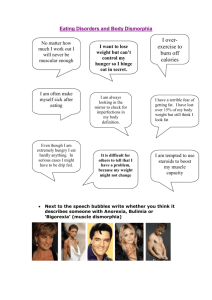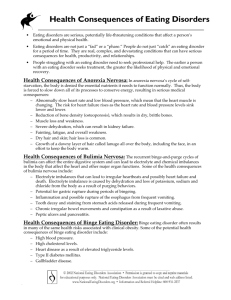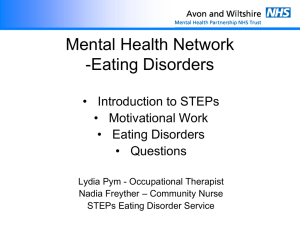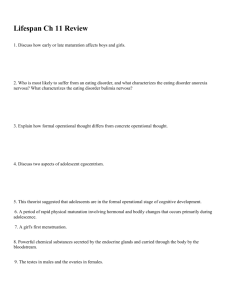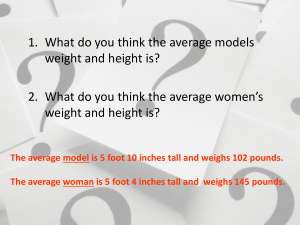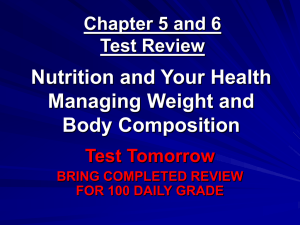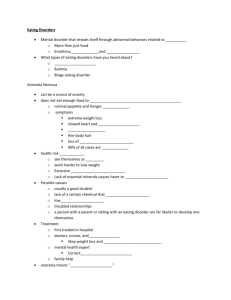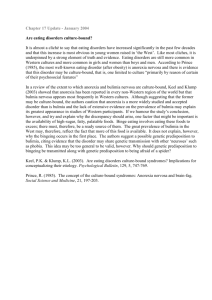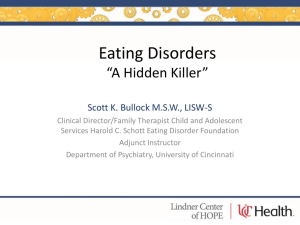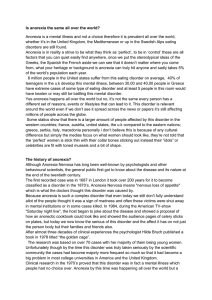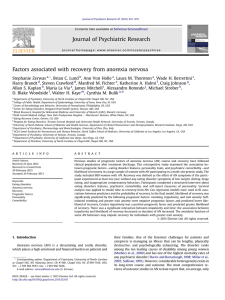Anorexia speech
advertisement
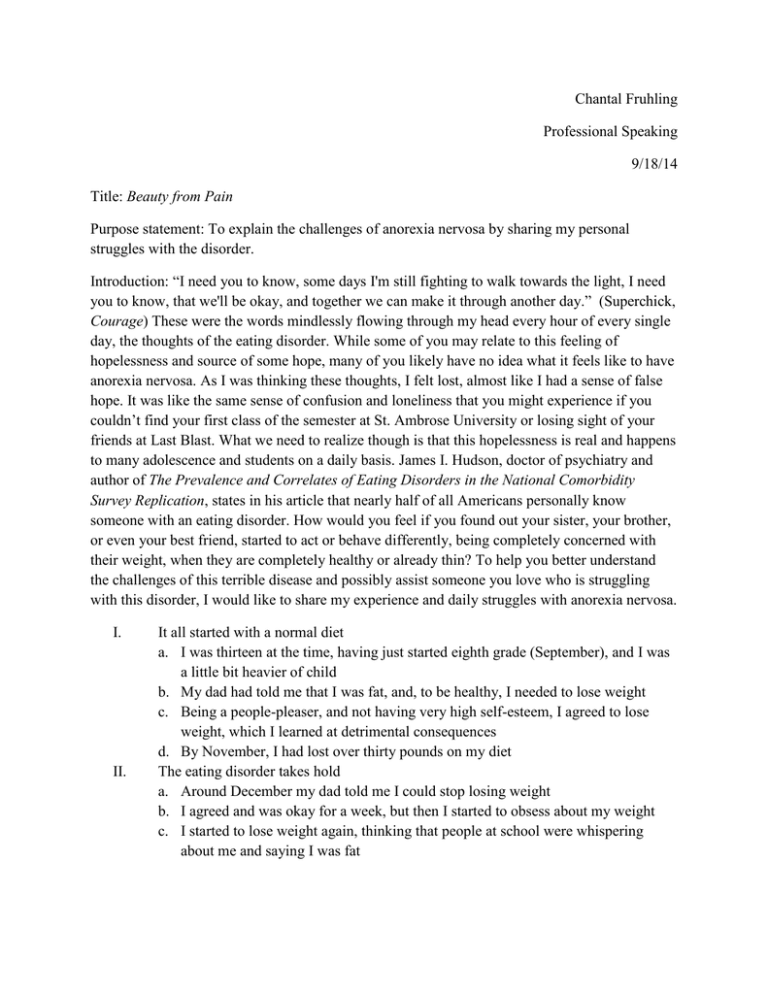
Chantal Fruhling Professional Speaking 9/18/14 Title: Beauty from Pain Purpose statement: To explain the challenges of anorexia nervosa by sharing my personal struggles with the disorder. Introduction: “I need you to know, some days I'm still fighting to walk towards the light, I need you to know, that we'll be okay, and together we can make it through another day.” (Superchick, Courage) These were the words mindlessly flowing through my head every hour of every single day, the thoughts of the eating disorder. While some of you may relate to this feeling of hopelessness and source of some hope, many of you likely have no idea what it feels like to have anorexia nervosa. As I was thinking these thoughts, I felt lost, almost like I had a sense of false hope. It was like the same sense of confusion and loneliness that you might experience if you couldn’t find your first class of the semester at St. Ambrose University or losing sight of your friends at Last Blast. What we need to realize though is that this hopelessness is real and happens to many adolescence and students on a daily basis. James I. Hudson, doctor of psychiatry and author of The Prevalence and Correlates of Eating Disorders in the National Comorbidity Survey Replication, states in his article that nearly half of all Americans personally know someone with an eating disorder. How would you feel if you found out your sister, your brother, or even your best friend, started to act or behave differently, being completely concerned with their weight, when they are completely healthy or already thin? To help you better understand the challenges of this terrible disease and possibly assist someone you love who is struggling with this disorder, I would like to share my experience and daily struggles with anorexia nervosa. I. II. It all started with a normal diet a. I was thirteen at the time, having just started eighth grade (September), and I was a little bit heavier of child b. My dad had told me that I was fat, and, to be healthy, I needed to lose weight c. Being a people-pleaser, and not having very high self-esteem, I agreed to lose weight, which I learned at detrimental consequences d. By November, I had lost over thirty pounds on my diet The eating disorder takes hold a. Around December my dad told me I could stop losing weight b. I agreed and was okay for a week, but then I started to obsess about my weight c. I started to lose weight again, thinking that people at school were whispering about me and saying I was fat III. IV. V. d. All of you can agree that when you don’t feel good about yourself (have low-selfesteem), it is very hard to believe that people actually think you are pretty enough or skinny enough. This is why I began to continue to lose weight. e. Lois J. Surgenor, Associate Professor of Department of Psychological Medicine, Christchurch School of Medicine and Health Sciences, University of Otago, Christchurch, New Zealand, stated in her research article that one of the causes of anorexia nervosa includes the notion that the disorder is dominant in people who have current or pre-morbid problems with low self-esteem. f. So, the question remained in my mind – am I too fat? Do I need to lose more weight for people to like me? The problem gets worse a. By January I had lost even more weight b. My friends were starting to look concerned, started to ask me if I was okay, said I was fine just stressed c. My parents began to worry, took me to counseling d. Became more obsessive over food, feeling lost in the grasp of the eating disorder The disease overcomes me a. Most of you can agree that, when you have lost all hope and are depressed, it is hard to get the strength to move on. Randy K. Hardman, doctor of psychology and author of Hope for the Hopeless: Depression and Eating Disorders, said in her article that people who have anorexia often want to have hope, to separate the depression from the self-hatred that can help them see the eating disorder for what it really is, with all its lies and consequences, and can help them begin to see who they are in a more honest and accurate way. This is all I wanted, the ability to realize that this was truly an enemy and to fully escape and move on. b. Continued to lose weight, was wasting away c. My parents and friends were crying, and counseling was not helping. It was like I was in deep water and did not know how to swim. d. My parents finally decided that enough was enough, decided to take action The hospital/recovery phase a. On January 29, 2008, my parents took me to hospital b. Because I weighed only eighty-seven pounds was hospitalized for two months c. Was able to recover, but it is continuous challenge Conclusion: Looking back on this situation, this experience in which I struggled and hurt, I realize that it is one of the hardest yet the most crucial times of my life. It not only helped me to realize who I am as a person, but showed me that there is hope even in the midst of the storms in my life. Clincher: So as we, as college students, enter into the real world, we need to realize that this disease is real and can hurt. While you might not have this disease, in the future, your friend, brother, sister, or coworker might have the symptoms for the disorder. Hopefully, now you realize that you can help them, and “bring light to the end of their tunnel.”
